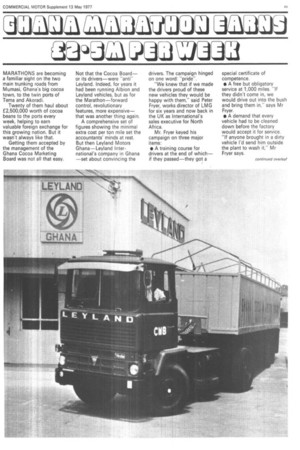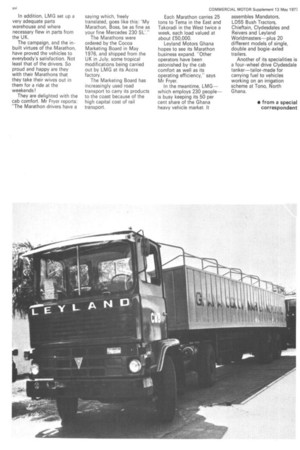JIIQJ0 11 LA2 lid Ji4JL:2
Page 212

Page 213

If you've noticed an error in this article please click here to report it so we can fix it.
LiiJJJ1i
MARATHONS are becoming a familiar sight on the two main trunking roads from Mumasi, Ghana's big cocoa town, to the twin ports of Tema and Akoradi.
Twenty of them haul about £2,500,000 worth of cocoa beans to the ports every week, helping to earn valuable foreign exchange for this growing nation. But it wasn't always like that.
Getting them accepted by the management of the Ghana Cocoa Marketing Board was not all that easy. Not that the Cocoa Board— or its drivers—were "anti" Leyland. Indeed, for years it had been running Albion and Leyland vehicles, but as for the Marathon—forward control, revolutionary features, more expensive— that was another thing again.
A comprehensive set of figures showing the minimal extra cost per ton mile set the accountants' minds at rest. But then Leyland Motors Ghana—Leyland International's company in Ghana —set about convincing the drivers. The campaign hinged on one word: "pride".
"We knew that if we made the drivers proud of these new vehicles they would be happy with them," said Peter Fryer, works director of LMG for six years and now back in the UK as International's sales executive for North Africa.
Mr. Fryer keyed his campaign on three major items: • A training course for drivers at the end of which— if they passed—they got a special certificate of competence.
• A free but obligatory service at 1,000 miles. "If they didn't come in, we would drive out into the bush and bring them in," says Mr Fryer.
• A demand that every vehicle had to be cleaned down before the factory would accept it for service. "If anyone brought in a dirty vehicle I'd send him outside the plant to wash it," Mr Fryer says. In addition, LMG set up a very adequate parts warehouse and where necessary flew in parts from the UK.
The campaign, and the inbuilt virtues of the Marathon, have proved the vehicles to everybody's satisfaction. Not least that of the drivers. So proud and happy are they with their Marathons that they take their wives out in them for a ride at the weekends!
They are delighted with the cab comfort. Mr Fryer reports: "The Marathon drivers have a saying which, freely translated, goes like this: 'My Marathon, Boss, be as fine as your fine Mercedes 230 SL'."
The Marathons were ordered by the Cocoa Marketing Board in May 1976, and shipped from the UK in July, some tropical modifications being carried out by LMG at its Accra factory.
The Marketing Board has increasingly used road transport to carry its products to the coast because of the high capital cost of rail transport. Each Marathon carries 25 tons to Tema in the East and Takoradi in the West twice a week, each load valued at about £50,000.
Leyland Motors Ghana hopes to see its Marathon business expand. "Other operators have been astonished by the cab comfort as well as its operating efficiency," says Mr Fryer.
In the meantime, LMGwhich employs 230 people— is busy keeping its 50 per cent share of the Ghana heavy vehicle market. It assembles Mandators, LD55 Bush Tractors, Chieftain, Clydesdales and Reivers and Leyland Worldmasters—plus 20 different models of single, double and bogie-axled trailers.
Another of its specialities is a four-wheel drive Clydesdale tanker—tailor-made for carrying fuel to vehicles working on an irrigation scheme at Tono, North Ghana.
• from a special correspondent























































































































































































































